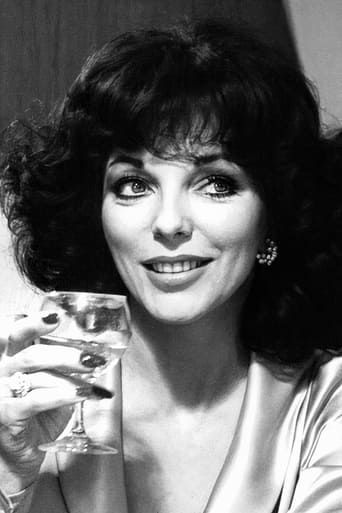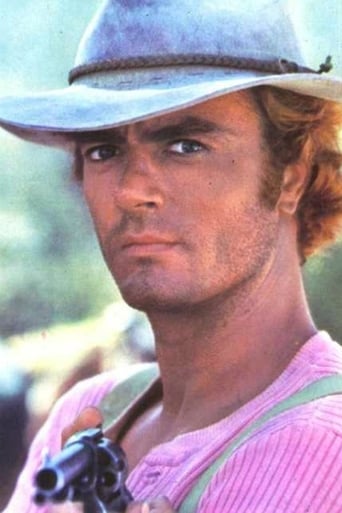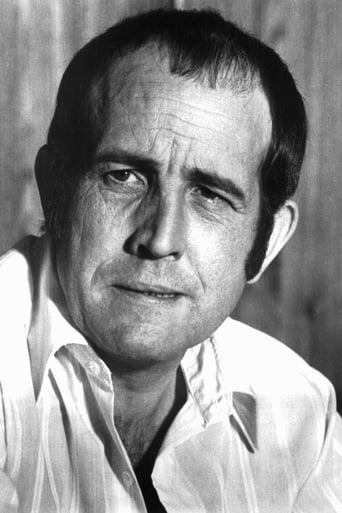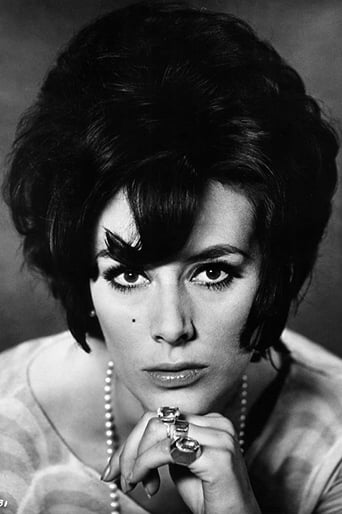Moustroll
Good movie but grossly overrated
Stevecorp
Don't listen to the negative reviews
Deanna
There are moments in this movie where the great movie it could've been peek out... They're fleeting, here, but they're worth savoring, and they happen often enough to make it worth your while.
Bob
This is one of the best movies I’ve seen in a very long time. You have to go and see this on the big screen.
gridoon2018
Unfortunately, "The Bitch" is neither campy enough nor trashy enough to live down to its sensational(istic) title. In fact, apart maybe from a pool-orgy sequence, it is rather quaint. Joan Collins' character is hardly even a bitch - she is just rich and liberated. She does get to flash her bare body, which should be enough to get a rise out of most viewers, but this film is more of a promo for disco music than anything else.
James Hitchcock
One of the more obscure items in Joan Collins's filmography is a film (written, produced and directed by her eccentric second husband Anthony Newley) with the magnificent title "Can Heironymus Merkin Ever Forget Mercy Humppe and Find True Happiness?", in which she plays a character with the equally wonderful name of Polyester Poontang, a name which I have always thought would have made a good stage name for Collins herself. "Poontang", after all, is a slang term (in America, if not in Britain) for a sexually attractive woman, whereas "polyester" denotes something artificial, a word which sums up Collins's acting at its worst. In her heyday in the late fifties and early sixties Collins was a star of some magnitude (a fact often overlooked by her detractors), but after failing to land the lead in "Cleopatra" she took a break from acting to spend more time with her family, and on her return was unable to break back into Hollywood. Most of her films from the late sixties and seventies were low-budget British offerings of widely varying quality. At least one of them, "Quest for Love", was excellent, but the majority were anything but, with "I Don't Want to Be Born" a particularly egregious example. And then, in the late seventies, Polyester hit on a brilliant way of revitalising her career. She would openly admit her true age (hitherto something of a movable feast) and reinvent herself as Britain's first middle-aged sex symbol, the glamorous, sexy Older Woman. Or perhaps not quite the first; her slightly older contemporary Diana Dors had been trying something similar without success, the difference being that Collins, unlike Dors, had preserved her youthful good looks well enough to make such a transformation plausible. The results were "The Stud" and its sequel "The Bitch", both based on novels by Joan's younger sister Jackie Collins. (The third Collins sister, Natasha, famously remarked "One of my sisters writes trash, the other acts in it"). In "The Stud", Joan played Fontaine Khaled, the British wife of a Middle Eastern businessman. (The character was possibly based on Soraya Khashoggi, née Sandra Daly). In its successor, Fontaine is now divorced and the owner of a trendy London nightclub (i.e. disco). Although this is a British film, the word "bitch" in the title is used in the American sense of "sexually promiscuous woman" rather than the more common British usage of "unpleasant or spiteful woman". The plot has something to do with Fontaine's financial problems, a stolen necklace, the Mafia, a horse race and a mustachioed Italian stud- the seventies being the last period in recorded history when a luxuriant moustache denoted rampant heterosexuality rather than the opposite- but none of these elements matter very much. The film-makers were less interested in them than they were in Fontaine's habit of dropping her knickers whenever there is a handsome man (or even an OK-looking man) anywhere in her vicinity. "The Stud" and "The Bitch" were generally panned by critics, yet both were huge commercial successes, the most successful British films of the seventies apart from the Bond franchise. There is, however, an explanation for this apparent contradiction. The films are little more than soft-core porn, and in an age when porn, whether hard- or soft-core, was much less easily available than it is today, any film involving nudity and sex scenes was virtually guaranteed to be good box-office. Just as the crowds who flocked to see "Emmanuelle" did not do so to admire Sylvia Kristel's acting technique or to polish up their French, so those who flocked to see "The Bitch" had more interest in seeing Joan get her kit off than they did in those aspects of film-making (direction, plot, dialogue, acting, character development, etc.) which are normally the concern of film critics. Which is just as well as the film is singularly lacking in all those departments. Apart from the incompetence of most of those who had a hand in making it, the film's worst sin is its pretentious tackiness; the scenes of Fontaine's apartment, the supposed luxury hotels and the supposedly high-class nightclub are all obviously intended to convey a sense of luxury and sophistication, but all they do is remind us, forcibly, of just why the seventies are best remembered as the decade that taste forgot. Collins is the film's only star of any real fame, but even she is just as awful as any of her co-stars. Indeed, her performance is perhaps less forgivable than theirs. They give poor performances because of a basic lack of talent; she gives one because of a total lack of sincerity. It is perhaps ironic that she is best-known for playing sultry femmes fatales, because on the evidence of "The Stud", "The Bitch" and "Dynasty" (where her character Alexis Carrington was essentially Fontaine Khaled toned down to meet the more puritanical standards of prime-time television) it is not the sort of role in which she excelled. Her performance here is marked by a sort of arch, knowing irony; her attitude could not have been more clear if she had worn a t-shirt throughout bearing the slogan "Daahling, I'm really a classically-trained RADA graduate- I'm only acting in this crap because it pays the mortgage". Collins is on record as alleging that "Can Heironymus Merkin….." was one of the factors leading to the breakdown of her marriage to Newley. This experience did not, however, dissuade her from intermingling her professional career with her marital affairs, as her third husband, Ron Kass, acted as the producer of "The Bitch". When that marriage also broke down a few years later, I am surprised that this film did not feature as an exhibit to her divorce petition. 2/10
paul_johnr
'The Bitch' was made during a soft-core craze in late 1970s Britain, when various types of pornography had theatrical releases. Soft-core titles were meant to be watched and forgotten in due time, having sated their viewers. Unfortunately for Joan Collins, 'The Bitch' and its 1978 predecessor 'The Stud' endured in the public conscience and have found their way onto the DVD market. Still embarrassed for playing the role of Fontaine Khaled, these trashy disco flicks helped to sink the reputation of Collins before renewing herself as Alexis Colby in the TV series 'Dynasty.'Collins has spoken little about her visits to the adult film market, which date as far back as 1969 with 'Can Hieronymus Merkin Ever Forget Mercy Humppe and Find True Happiness?' She has good reason, since 'The Bitch' marked the low point of her career and exemplifies a good actress slumming it up. Certainly, 'The Bitch' is all-out sleaze, a movie that few would admit in public to watching. While this film steered Collins towards her role as Alexis Colby, it also put the 40-something actress out of commission until the next decade.In 'The Stud,' nightclub owner Fontaine Khaled separates from her husband Ben after a series of extramarital trysts, including one with the 'Stud,' Tony Blake. Fontaine has since become a free-wheeling divorcée, at liberty to bed any man she pleases. This leads to a hook-up with Nico Cantafora (Antonio Cantafora, under the name 'Michael Coby'), an Italian gambler who owes large debts to the Mafia. Fontaine is used to smuggle a diamond ring into England that would raise Nico some cash, until she finds out and takes up a bitchy posture with him…The 'plot' is less complicated then it sounds, a cardboard storyline with interludes of sex that feature as little emotional connection as possible. This was the era, don't forget, when gazing at someone from across a roulette table could land you an immediate date in the sack (or at least movies had you think). 'The Bitch' has all of the usual traits for soft-core pornography: minimal plotting, minimal character development, cheap production values, shoddy technical work, and horrendous acting. It has all of this and plenty of gratuitous skin, making 'The Bitch' so putrid that it's even low in camp value. While offering a small glimpse into the disco world of late 1970s England, there are few over-the-top or outrageous moments to keep us interested. Most of it is smug and lifeless, with enough flashing lights and pounding disco music to have you screaming for Novocain. If 'The Bitch' had a decent plot and some class, it would be fairly watchable. But as a 28-year-old who is removed from the disco era, I don't find excitement in bedding every person that moves, pool orgies, and watching two people shag to 'Claire de Lune,' as happens here. The sex scenes are not erotic in the least; they are actually depressing because of the complete lack of feeling in them. Joan Collins handles herself well under the circumstances, but most of the lead cast that includes Antonio Cantafora, Kenneth Haigh, and Ian Hendry is terrible. Considering how empty the plot and dialogue are, you can't really blame them. The fault lies in poor scriptwriting and direction by Gerry O'Hara ('Fanny Hill'), besides the novel by Jackie Collins upon which this film is based.One of few strong points in 'The Bitch' is a disco soundtrack that captures the 1970s musical landscape, but it is overdone by sound technicians David Crozier and Michael Hopkins, who were perhaps trying to fill some of the void. In the nightclub scenes, much of the dialogue is swallowed up by pulsating music, which was typical for a disco but counterproductive in a film - not that you'll miss very much, because nothing of importance is said and people don't watch movies like this for the vast soliloquies. Original music is supplied by Biddu and Don Black, including the cheap main title. The visual quality by cinematographer Dennis Lewiston is actually not too bad, recording the flamboyant colors of 1970s dance and dress. Lewiston, however, uses superficial zooms and camera angles in a grope at artistry. Soft visuals give 'The Bitch' an added seediness that is clearly in line with adult films.The only reason why 'The Bitch' and 'The Stud' exist today is Joan Collins's presence. They are nothing more than average 1970s skin flicks, a long line of which has faded into oblivion. Fans of Collins who don't know about these two movies will be unpleasantly surprised if they decide to check them out. 'The Bitch' has been released on DVD in the United States by Trinity Home Entertainment with the minimal treatment it deserves. This epic 89-minute film (*wink-wink*) is presented in full frame with no widescreen option. Sound is in Dolby Digital 2.0, which is often muddled and does nothing to correct the imbalance between music and dialogue. The visual quality on a TV set is acceptable, with Lewiston's soft tone and pastel colors steady throughout. A computer monitor reveals severe grain and artifacts, proof that Trinity could not be bothered with restoration. As always, widescreen is preferable and it would be interesting to see how this rubbish was promoted in the theatrical trailer. I'm also not sure why cast member Pamela Salem is displayed on the main menu screen instead of Collins, but little about this film makes any sense.½ * out of 4
Peter Hayes
An owner of a 1970's London disco gets sexually involved with a shady medallion man who may have dangerous Mafia links.What a pile of junk this is! But, somehow and some way, I have a soft spot for it. A guilty pleasure that should be whispered lightly and only in limited company. It is so camp that on release it probably drove drag queen rushing towards the exits.It does - however - capture the 70's disco scene and fashions as well as the faceless hits that pumped out of them. Clear and brainless padding though they are.This is based on a (Jackie) Collins novel that shows the imagination of a newt: discos, glamour, the mob, diamonds, dancing and guys who think they look better with a thick moustache. If you were given the task of writing a script based on clichés you couldn't do better than this.Lead Joan Collins, only a few years before so down-on-her-luck that she was signing on the dole, takes her clothes off for about six milliseconds to reveal a pale skinny body that has seen better days, but you still would, wouldn't you? Everyone hated discos, even the people that went to them every week. Boring places where girls danced around handbags and every girl you spoke to was "waiting for her boyfriend." A plastic imitation of a good time. Not to mention that horrible, insisting, pounding music that made any dance floor conversation impossible. If there is a hell - it must be like a 70's disco.Yes, you are probably going to hate it. Yes, you won't see what the point it is. But it is like a bad war film about a war that you went through yourself and have the scars to prove it - it keeps you involved even though there is a million other things that you really should be doing.






